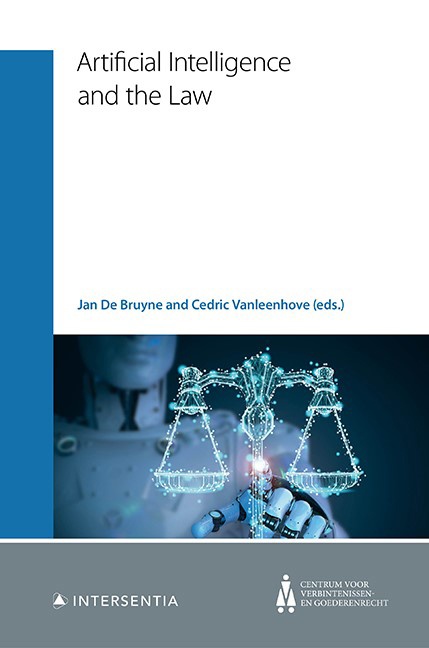Book contents
- Frontmatter
- Contents
- Foreword
- Contributing Authors
- Chapter 1 Basic Concepts of AI for Legal Scholars
- Chapter 2 Different Models of Innovation and Their Relation to Law
- Chapter 3 Setting the Scene: On AI Ethics and Regulation
- Chapter 4 Quantitative Legal Prediction: the Future of Dispute Resolution?
- Chapter 5 AI Arbitrators … ‘Does Not Compute’
- Chapter 6 AI through a Human Rights Lens. The Role of Human Rights in Fulfilling AI’s Potential
- Chapter 7 Killer Robots: Lethal Autonomous Weapons and International Law
- Chapter 8 AI and Data Protection: the Case of Smart Home Assistants
- Chapter 9 AI and IP: a Tale of Two Acronyms
- Chapter 10 Tax and Robots
- Chapter 11 Robotisation and Labour Law. The Dark Factory: the Dark Side of Work?
- Chapter 12 The Hypothesis of Technological Unemployment Caused by AI-Driven Automation and its Impact on Social Security Law
- Chapter 13 AI in Belgian Contract Law: Disruptive Challenge or Business as Usual?
- Chapter 14 Tort Law and Damage Caused by AI Systems
- Chapter 15 Insurance Underwriting on the Basis of Telematics: Segmentation and Profiling
- Chapter 16 AI and Creditworthiness Assessments: the Tale of Credit Scoring and Consumer Protection. A Story with a Happy Ending?
- Chapter 17 AI and the Consumer
- Chapter 18 Robots and AI in the Healthcare Sector: Potential Existing Legal Safeguards Against a(n) (Un)justified Fear for ‘Dehumanisation’ of the Physician-Patient Relationship
Chapter 1 - Basic Concepts of AI for Legal Scholars
Published online by Cambridge University Press: 26 May 2021
- Frontmatter
- Contents
- Foreword
- Contributing Authors
- Chapter 1 Basic Concepts of AI for Legal Scholars
- Chapter 2 Different Models of Innovation and Their Relation to Law
- Chapter 3 Setting the Scene: On AI Ethics and Regulation
- Chapter 4 Quantitative Legal Prediction: the Future of Dispute Resolution?
- Chapter 5 AI Arbitrators … ‘Does Not Compute’
- Chapter 6 AI through a Human Rights Lens. The Role of Human Rights in Fulfilling AI’s Potential
- Chapter 7 Killer Robots: Lethal Autonomous Weapons and International Law
- Chapter 8 AI and Data Protection: the Case of Smart Home Assistants
- Chapter 9 AI and IP: a Tale of Two Acronyms
- Chapter 10 Tax and Robots
- Chapter 11 Robotisation and Labour Law. The Dark Factory: the Dark Side of Work?
- Chapter 12 The Hypothesis of Technological Unemployment Caused by AI-Driven Automation and its Impact on Social Security Law
- Chapter 13 AI in Belgian Contract Law: Disruptive Challenge or Business as Usual?
- Chapter 14 Tort Law and Damage Caused by AI Systems
- Chapter 15 Insurance Underwriting on the Basis of Telematics: Segmentation and Profiling
- Chapter 16 AI and Creditworthiness Assessments: the Tale of Credit Scoring and Consumer Protection. A Story with a Happy Ending?
- Chapter 17 AI and the Consumer
- Chapter 18 Robots and AI in the Healthcare Sector: Potential Existing Legal Safeguards Against a(n) (Un)justified Fear for ‘Dehumanisation’ of the Physician-Patient Relationship
Summary
INTRODUCTION
1. Artificial Intelligence has become a hot topic due to major advances in the field. However, many people participate in the debate without having the necessary understanding of the subject. In this chapter, we will explain some basic concepts of AI that may be useful for legal scholars and practitioners. It will provide readers with the necessary background to fully understand the impact of AI on law.
First, we provide a clear definition of AI and discuss the Turing Test. This test was a first controversial attempt to measure machine intelligence (part 2). We then focus on the working of AI. We consider two main AI approaches, namely knowledge-based and data-based learning. The latter is gaining importance every day, mainly due to the massive production of data by the Internet of Things (IoT). Machine learning (ML) can be considered the core of the data-based approach. One very popular ML method is the artificial neural network (ANN), which is described as well. We briefly discuss how it works and focus on its evolution into deep learning (DL). This evolution results from the increased data production and computing power. While DL has been a quantum leap for AI, it also has some drawbacks. These will be covered as well (part 3). AI has several sub-disciplines, many of which rely on ML. We briefly discuss search algorithms, computer vision, natural language processing (NLP), speech processing and agents (part 4). Having touched upon the foundations of AI, we subsequently focus on the wide range of areas and fields in which AI is already used. We discuss the current state of the art and expected evolutions in transportation, robotics, healthcare, education, public safety and security, art and entertainment, and law. We also look at the more distant future of AI (part 5). We conclude this chapter with some considerations regarding the ethical and safety aspects of AI (part 6).
DEFINING AND MEASURING AI
DEFINITION: WHAT IS AI?
2. Nowadays, AI is ubiquitous in the news. This results in a huge number of articles and (academic) papers on this technology. These texts are usually either overly optimistic or pessimistic1 regarding the possibilities as well as the dangers and challenges of AI.
- Type
- Chapter
- Information
- Artificial Intelligence and the Law , pp. 1 - 22Publisher: IntersentiaPrint publication year: 2021



